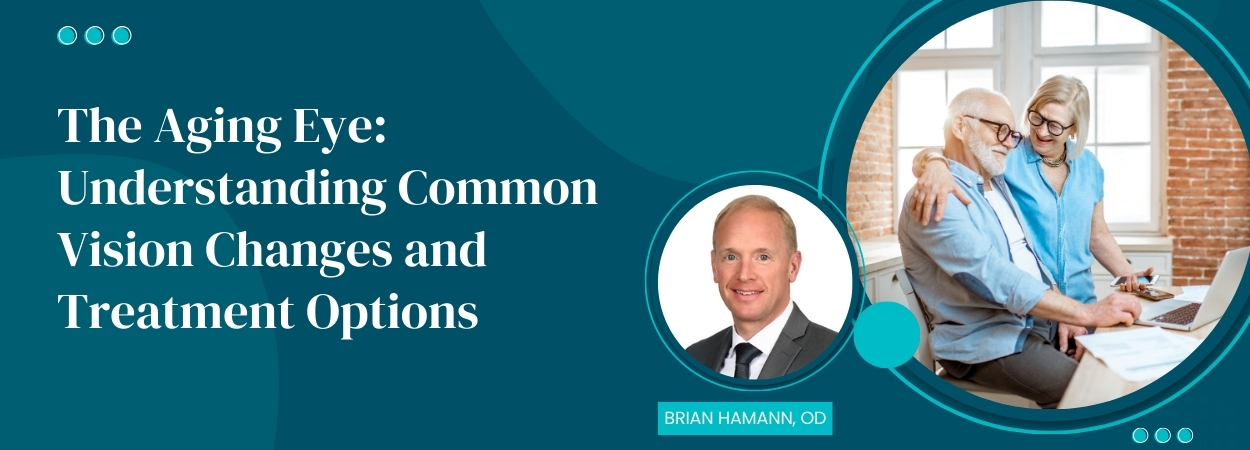Posted by: Northwest Eye in News on March 15, 2024
Understanding Common Vision Changes and Treatment Options

As we age our bodies go through a multitude of changes, and our eyes are no exception. The aging process brings several alterations in our vison, some of which are inevitable, while others can be managed with proper care and treatment. Understanding these changes can help you maintain healthy vision well into your later years.
Presbyopia:
One of the most common age-related changes is presbyopia, also known as farsightedness. This inevitable change is the gradual loss of your eyes’ ability to focus on nearby objects typically starting in your early to mid-forties. Presbyopia is the natural occurrence of your lens hardening and losing its flexibility, making it difficult to do tasks up close such as reading, threading a needle, or seeing your phone.
Treatment options for presbyopia include:
- Reading glasses: Reading glasses are only needed when performing a close-up task as they are designed to specifically correct near vision.
- Bifocal glasses: With two distinct optical powers, bifocals are useful for those who need near and far correction. The top part of the lens corrects far vision, and the lower part will make a distinct jump to view nearer items.
- Progressive glasses: Unlike traditional bifocals, progressive lenses offer a seamless transition between distance, intermediate, and near vision, providing clear vision at all distances.
Cataracts:
Cataracts are another common age-related vision problem, occurring when the natural lens of the eye becomes cloudy. This can cause blurred or dimmed vision, sensitivity to light and glare, and a fading or yellowing of colors. While they are a natural part of the aging process, they can significantly impact daily activities if left untreated.
Treatment options for cataracts include:
- Cataract surgery: During this procedure, the cloudy lens is removed and replaced with an artificial intraocular lens (IOL). There are many different types of IOLs, and your surgeon will discuss the options that are available to you. Some of the specialty IOLs offer reduced dependency on glasses after surgery.
Traditional vs. Advanced Refractive Cataract Surgery
Check out the video of Dr. Jesse Dovich (right) where he explains the difference between traditional cataract surgery and Advanced Refractive Cataract Surgery. Cataract surgery is highly successful in restoring vision and improving quality of life.
Age-Related Macular Degeneration (AMD):
Age-related macular degeneration is the deterioration of the macula, the part of the retina that is responsible for sharp, detailed vision. People with AMD will often experience blurred vision, dark or empty areas of their central vision, spots, and vision distortion. This progressive eye condition can lead to substantial loss of central vision.
While there is no cure for AMD, there are treatment and management options such as:
- Regular monitoring with your doctor every 3-6 months to track the progression of the disease.
- Intra-vitreal injection is a medication that is administered to the vitreous cavity of the eye. These injections have an immediate therapeutic effect on the retinal tissue.
Glaucoma:
Glaucoma is a group of diseases that cause damage to the optic nerve, often caused by elevated intraocular pressure. As glaucoma progresses, it can result in peripheral vision loss, and if untreated, blindness.
Treatment options for glaucoma include:
- Medication – Often in the form of eye drops or pills, these medications help lower eye pressure to reduce or drain fluid from the eye.
- Laser treatment – Selective Laser Trabeculoplasty (SLT) is a minor procedure where your ophthalmologist will apply a beam of light to the trabecular meshwork. SLT usually reduces eye pressure and can help drain fluid.
- Surgery – Surgical procedures like trabeculectomy or minimally invasive glaucoma surgery (MIGS) may be recommended to lower intraocular pressure and preserve vision.
Importance of Regular Eye Exams
While your eyes naturally age, it is still important to take proactive measures to protect your vision. This starts with an annual eye exam. Early detection and treatment of any eye issue can significantly safeguard your vision and prevent potential vision loss.
“Having a Comprehensive Eye Exam every year is the means to obtaining and maintaining the best vision and ocular health throughout your life. If a change or decrease in vision is noticed in between regular visits, call and schedule an appointment as soon as possible. Most eye conditions or diseases can be treated if they are discovered early. In some instances, permanent loss of vision can occur within a day or two if treatment is delayed.”
Dr. Brian Hamann
In addition to regular eye exams, Dr. Hamann recommends some lifestyle changes to reduce the risk of vision loss. These include wearing sunglasses when outside, not smoking, maintaining an active lifestyle, and following a healthy diet rich in fruits and green leafy vegetables.
By staying informed about common vision problems and treatment options, you can take the right steps to protect and preserve your vision. Take charge of your eye health today by scheduling an appointment with a Northwest Eye doctor. You can request an appointment below or call (763) 416-7600.




